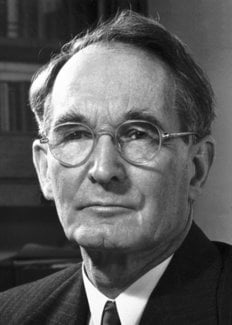Percy W. Bridgman
Biographical

Percy Williams Bridgman was born in Cambridge, Massachusetts, on April 21st, 1882. He received his early education in public schools in the nearby city of Newton until 1900 when he entered Harvard University. He graduated A.B. in 1904, A.M. in 1905 and was awarded his Ph.D. (Physics) in 1908 when he joined the Faculty of the University. Bridgman was successively appointed Instructor (1910), Assistant Professor (1919), before becoming Hollis Professor of Mathematics and Natural Philosophy in 1926. He was appointed Higgins University Professor in 1950.
His researches concerning the effects of high pressures on materials and their thermodynamic behaviour commenced in 1905 and have continued throughout his career. He has carried out extensive investigations on the properties of matter at pressures up to 100,000 atmosphere including a study of the compressibility, electric and thermal conductivity, tensile strength and viscosity of more than 100 different compounds. He developed a method of packing which eliminated leak, and later introduced various methods of external support to pressure vessels as higher pressures were demanded. Bridgman has also contributed to crystallography, where he devised a method of growing single crystals; to the problems of electrical conduction in metals, where he discovered internal Peltier heat – a new electrical effect; and to the philosophy of modern physics. In the latter field, he is a strong supporter of the operational viewpoint, considering it meaningless to interpret physical concepts except as they are capable of observation.
Prof. Bridgman has contributed many papers to leading scientific journals and he is the author of Dimensional Analysis (1922), The Logic of Modern Physics (1927), The Physics of High Pressure (1931), The Thermodynamics of Electrical Phenomena in Metals (1934), The Nature of Physical Theory (1936), The Intelligent Individual and Society (1938), The Nature of Thermodynamics (1941), and, more recently, Refections of a Physicist.
He has received honorary Doctor of Science degrees from Stevens Institute (1934), Harvard (1939), Brooklyn Polytechnic (1941), Princeton (1950), Paris (1950), and Yale (1951). He has received the Rumford Medal (American Academy of Arts and Sciences), the Cresson Medal (Franklin Institute), the Roozeboom Medal (Royal Academy of Sciences of the Netherlands), the Comstock Prize (National Academy of Sciences), and the New York Award of the Research Corporation. He was a member of the American Physical Society (President, 1942), the American Association for the Advancement of Science, the American Academy of Arts and Sciences, the American Philosophical Society, and the National Academy of Sciences. He was a Foreign Member of the Royal Society and Honorary Fellow of the Physical Society (London).
Bridgman married Olive Ware in 1912. Their daughter, Jane, was born in I9I4, and their son, Robert Ware, in 1915.
Prof. Bridgman died in 1961.
This autobiography/biography was written at the time of the award and first published in the book series Les Prix Nobel. It was later edited and republished in Nobel Lectures. To cite this document, always state the source as shown above.
Percy W. Bridgman died on August 20, 1961.
Nobel Prizes and laureates
Six prizes were awarded for achievements that have conferred the greatest benefit to humankind. The 12 laureates' work and discoveries range from proteins' structures and machine learning to fighting for a world free of nuclear weapons.
See them all presented here.
